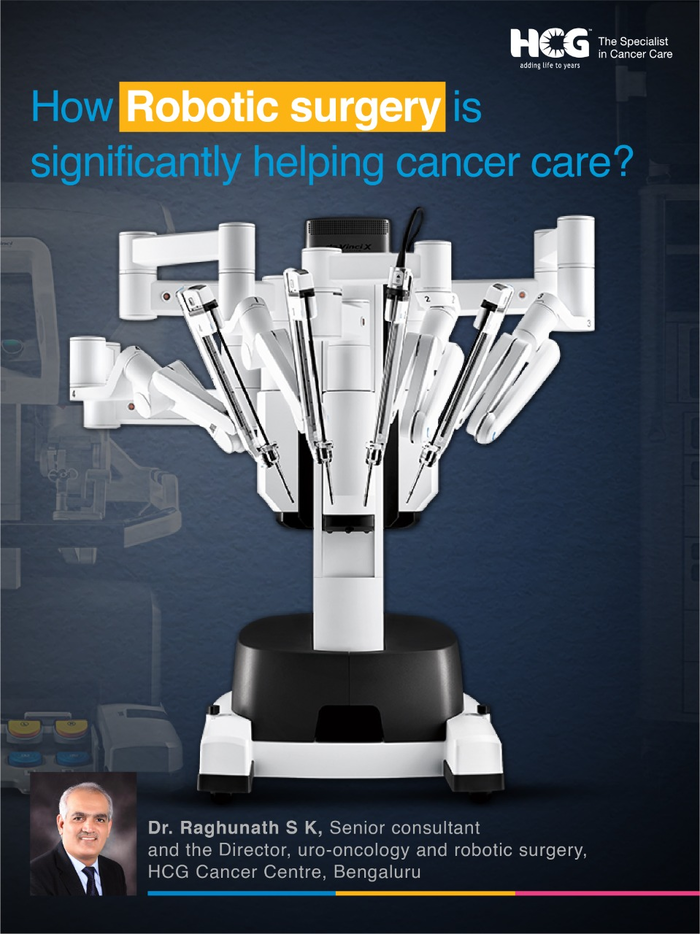Role of robotics in surgical oncology and its significance today:
Robotic surgery has enabled surgeons to perform various complex procedures with greater precision and control through enhanced 3D vision and tremor free human-like wrist movements of the robotic instruments. This has greatly improved oncological and functional outcomes of cancer patients. Decreased productivity, physical and social impact of cancer inflict a heavy cost on patients and their families. Minimal tissue damage and blood loss ensure patients have faster recovery and short hospital stay so that they are able to resume their daily routine soon.
Robotic surgery plays a pivotal role in treating Head and Neck, Thoracic, Gastrointestinal, Hepatobiliary, Gynaecological, Genitourinary cancer, and more. In all of these cases, robotic surgery enhances visualisation of the surgical field leading to greater precision in identifying the exact location of the tumour and its removal without interfering with the surrounding healthy tissues, thereby minimizing post-procedural complications.
The challenges and opportunities of Robotic surgery in cancer care:
Many surgical specialties are incorporating robotic surgery into their operative management for a variety of cancers, especially urologic (prostate, kidney, bladder), gastrointestinal cancers (stomach, pancreas, colorectal), gynaecological cancers (uterus, ovary) and head and neck cancers.
This is due to the various advantages like:
- Minimally invasive
- Magnified High-Definition 3D image
- Precise tremor free movements with EndoWrist Instruments
- Potential Reduction of Positive Surgical Margins
- Enhanced Ergonomics leading to less fatigue Considerably less post-operative pain
- Reduction of Surgical Site Infections (SSI)
- Reduction of blood loss
- Shorter Hospital Stay
- Early recovery and return to the daily routine
- Shorter learning curve compared to conventional Laparoscopic surgery
- Improved Training
Some of the challenges are:
- Less familiarity of patients with robotic surgery which makes counselling and discussion with the patient more challenging
- Large space needed to house the robotic system
- High cost of use and maintenance
- Lack of tactile and haptic feedback
- Current residency curriculum lacks teaching of robotic surgical skills
- It can be conducted only in those centres that can infrastructural afford the technology
- It requires specially trained surgeons to conduct robot-assisted surgeries. Not everyone can conduct this procedure without training.
- Robotic malfunction which is extremely rare and hardly happens.
Robotic surgery needs a well-coordinated team of trained specialists and supporting staff who are aware of the functioning of the da Vinci Surgical System and the safety measures that need to be incorporated during the performance of a robot-assisted procedure. The surgeons have to be extensively trained and experienced to be able to perform such technologically advanced procedures.
Evolution of da Vinci Surgical System robotic surgery and barriers that prevent the adoption in cancer care:
Da Vinci system was the first commercially available robot to get US FDA approval in 2000 for general laparoscopic surgery. Since then we have witnessed its phenomenal rise with thousands of robotic surgeries being performed each year. There are various generations of robots like S ,Si, X and Xi available in India. Distinct from prior generations, the latest da Vinci Xi system uses a gantry system or boom to position the instrument manipulators directly over the operating table. This gantry makes the position of the cart base largely independent from the orientation of the surgical workspace, thereby allowing the operating room staff more ease and flexibility when positioning the base of the cart at the bedside. Higher initial cost of investment along with higher cost of use and maintenance has somewhat hindered its adoption in our country. But, with all the advantages mentioned previously and a shorter learning curve than laparoscopic surgery will balance out the higher cost subsequently.
Future of robotic surgery in Oncology:
Newer robotic systems like Senhance, Versius, Avatara, Hintori have been developed in recent years with various design modifications like miniaturization of instruments, providing haptic feedback and eye-tracking control of camera. This competition would lead to better innovations and potentially reduce cost of surgery. Augmented Reality (AR) provides an advanced user interface that enhances surgeon’s perception improving dexterity and precision. This can be achieved through various means, like a Projector based AR or a Head Mounted Display (HMD). AR integrated robotic surgery is still evolving, and one can expect its clinical use in the near future. The future of robotic surgery is exciting, and we expect new technologies will enable surgeons to provide best patient care in a cost-effective manner.
Advantages of robotic surgery:
Greatest advantage is
- 3D vision
- 10-40 times magnification
- Dexterity of instructions with 7 degrees of freedom
All these help to perform surgery very precisely which translates to better outcomes with lesser complications and early recovery. With lesser pain, blood loss and reduced chance of contracting infection, robotic surgery reduces hospital stay compared to what is required for traditional surgeries.
Compared to traditional surgery that requires a large incisions, robotic surgery is considered to be minimally invasive as it involves making a very small incisions. A smaller incision implies significant reduction in post-procedural complications and recovery times compared to that of a traditional surgery. Also, robotic surgery gives the surgeons unrivalled flexibility and accuracy which is considerably more than traditional ones.


